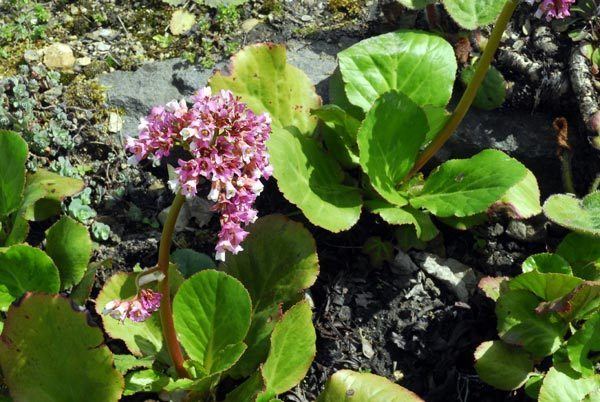Diuretic herbs are those which increase the rate of urine flow, sodium excretion and to adjust the volume and composition of body fluids in a variety of clinical situations such as hypertension, nephrotic syndrome, renal failure etc. These herbs mainly act on the kidneys. These herbs are widely explored in Indian ancient system of medicine. One such herb described in Ayurveda is Pashanbheda – meaning ‘stone breaker’. It is a well-known herb in Ayurveda which is mainly used as diuretic and lithotropic. The Hindi name of Pashanbheda herb is ‘Patharchoor’ and in Sanskrit, it is known by the names such as- Ashmagna (which destroys renal stones), Upalabhedaka (destroys the flat surface of the stone), Sailobheda (penetrates through the stones) and Shilabheda (grows between the wedges of stones). All these synonyms explain about the urolithic action of the herb.

The plant grows in between the wedges of the stones in the mountains. The root of the plant is reddish in colour. It is a small shrub found in the mountain region of Himalaya growing at an altitude of 900-3000 meters.
The most common species of marketed formulations used as Pashanbheda are:
- Coleus. aromaticus (leaves)
- Kalanchoee. pinnata (leaves)
- Bergenia. ligulata (rhizomes)
Ayurvedic Properties of Pashanbheda are:
- Rasa (Taste): Tikta (bitter) and Kashaya (astringent)
- Guna (Qualities): Snigdha (oiliness) and Laghu (lightness)
- Veerya (Potency): Sheeta (cold)
- Vipaka: Katu (undergoes pungent taste conversion after digestion)
- Effect on Dosha: Tridoshahara (balances all the three doshas)
- Prabhava (Effect or Special Action): Ashmari bheda (crushes the renal stones)
Chemical Constituents of Pashanbheda:
The rhizome of the plant Bergenia lingulata is rich gallic acid, starch, glucose, tannins, mucilage, wax and bergenin.
Traditional Ayurvedic indications of Pashanbheda herb are:
- Bhedna – piercing in nature
- Basti shodhana – cleanses urinary bladder
- Prameha – urinary tract disorders, diabetes
- Pleeha – spleen related disorders
- Shoola – abdominal colic
Uses of Pashanbheda Powder in Ayurveda:
- Ashmari Bhedana (breaking kidney stones): Pashanbheda is one of the best herbs for kidney stones due to its natural anti-urolithic action.
- It treats urolithiasis owing to its Vata-Kapha pacifying action and mutral (diuretic) effect.
- It works by averting the formation of calculi and helps in eliminating stones via urine by increasing the urine output without hurting any part of urinary system and give satisfactory results.
- Helpful in Dysuria: The diuretic property of pashanbhed is helpful in the condition dysuria or low urine output.
- The diuretic action of pashanbheda may be due to the presence of bioactive compounds such as saponins and flavonoids.
- Heals wounds: The roots of Pashanbheda possesses strong astringent and cooling actions. These properties are helpful in bleeding, inflammation and also speed up the healing process.
- For boils, dried root extract of pashanbheda is applied topically for treating boils, wounds, cuts and burns.
- Mutrakrichha (painful urination): Pashanbheda not only helps in breaking kidney stones but also beneficial in overall working of urinary system. Thus, it is widely recommended in Ayurveda for painful urination.
This herb is also used in Ayurveda for liver related troubles, hypertension, heart disorders, diabetes, high grade fever along with other Ayurvedic medicines.
This herb modulates the volume and composition of body fluids in a variety of clinical conditions like hypertension, heart failure etc. with no toxicity.
Dosage: 3-6 g of fine powder is administered.
The decoction of the root of Berginia ligulata is given in the dosage of 40-50 ml daily in divided dose to treat renal calculi, retention of urine in the bladder, burning micturition etc.
Some Ayurvedic formulations containing Pashanbheda are:
- Mootrvirechaniya Kashaya: Mootravirechaniya Kashaya is used to relieve retention of urine, cleansing the bladder and treatment of urinary tract infections.
- Ashmarihara Kashaya: Ashmarihara Kashaya is an Ayurvedic medicine taken in decoction form. It is used in the treatment of urinary calculi.
- Vastyamayantaka Ghrita: It is an Ayurvedic medicine in medicated ghee form and used to treat the disorders related to the urinary bladder like stones in the urinary system and urine retention.
Adverse effect of Pashanbheda:
There is no contraindication known or any adverse effects reported.
Thus, Pashanbheda is safe, effective and inexpensive indigenous remedy which is gaining popularity for the safe treatment of stones in the urinary system.
Disclaimer:-
This article is not a substitute to the standard Medical Diagnosis or personalized Ayurvedic Treatment! It is intended only for Information!
For experts consultation, please write us at care@blessayurveda.com.
4,752 total views, 3 views today